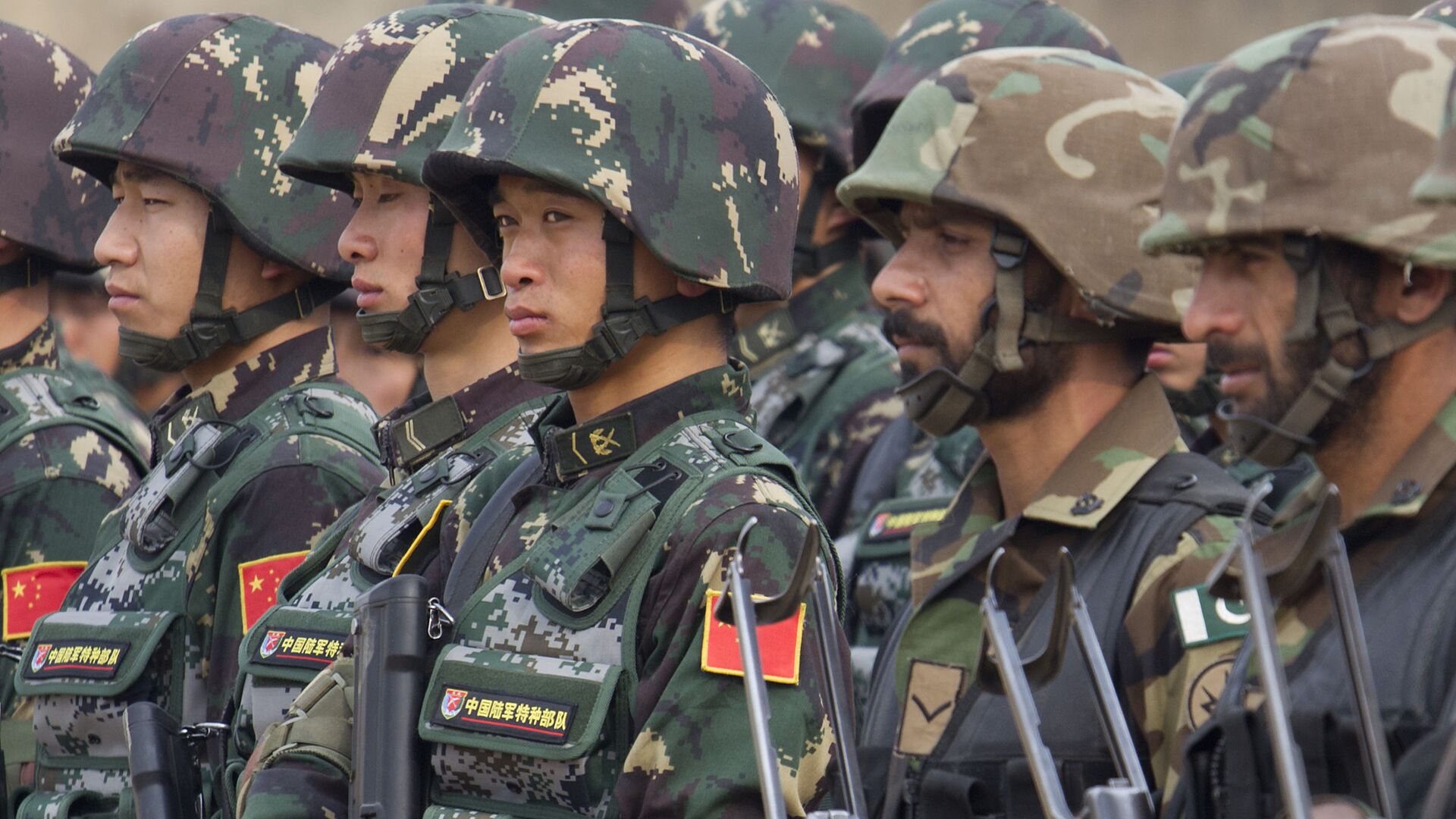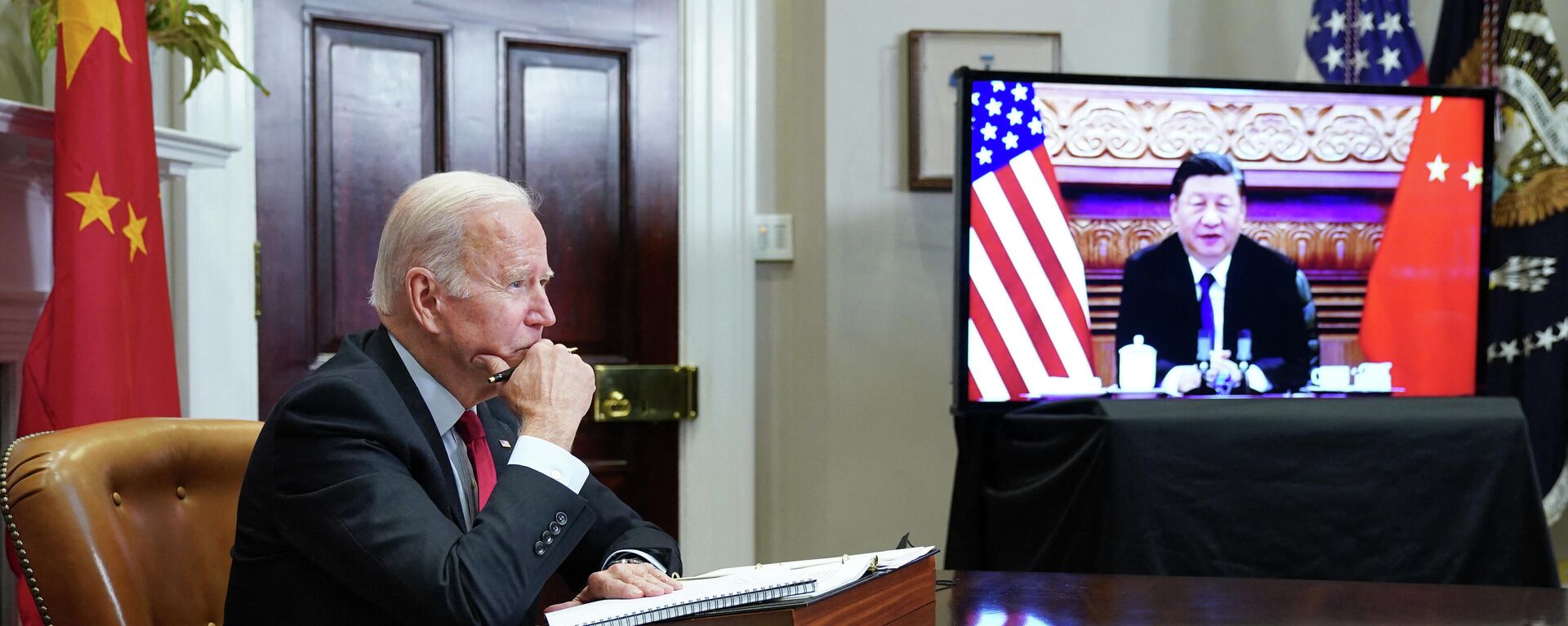https://sputnikglobe.com/20220613/china-pakistan-to-deepen-military-ties-to-deal-with-complicated-factors-in-the-region-1096262296.html
China, Pakistan to Deepen Military Ties to Deal With 'Complicated Factors' in the Region
China, Pakistan to Deepen Military Ties to Deal With 'Complicated Factors' in the Region
Sputnik International
Talks between the militaries of Islamabad and Beijing took place a month after Pakistani foreign minister Bilawal Bhutto Zardari visited China where he met his... 13.06.2022, Sputnik International
2022-06-13T11:27+0000
2022-06-13T11:27+0000
2022-12-08T18:02+0000
china
karachi
balochistan liberation army
china-pakistan economic corridor (cpec)
belt and road initiative
kashmir
asia
pakistan
https://cdn1.img.sputnikglobe.com/img/07e5/06/09/1083108487_0:132:2316:1435_1920x0_80_0_0_50e1cc7cba115ca0a3d5e5775e0bdccb.jpg
The military leaderships of China and Pakistan have said that they will “deepen pragmatic exchanges” and deal with “complicated factors in the regional situation,” according to an official release by the Chinese Ministry of National Defence on Sunday evening.The communique was released at the end of a three-day visit (9 to 12 June) by Pakistan’s Chief of Army Staff (COAS) General Qamar Javed Bajwa to China. On Sunday, Bajwa held high-level talks with General Zhang Youxia, the Vice-Chairman of China's Central Military Commission (CMC), in the eastern city of Qingdao.The GSI, which Beijing says is already being “implemented”, has “opposed dividing” the Asia-Pacific region with the Indo-Pacific Strategy, a US-led initiative that has enshrined the role of groupings such as the Quad and trilateral AUKUS pact (Australia, UK and the US).The GDI, on the other hand, was proposed by Chinese President Xi Jinping last September during his video address to the United Nations (UN) General Assembly. It calls for advancing “global development” through a “new stage of balanced, coordinated and inclusive growth”.India, which is locked in border disputes with both Pakistan and China, is a member of the Quad, which also comprises Australia, Japan and the US. The Quad advocates a "free and open Indo-Pacific region" as well as upholding the UN Convention on the Law of the Sea (UNCLOS). Beijing perceives the Quad to be directed against it and has said that it is akin to an Asian NATO.New Delhi also opposes the China-Pakistan Economic Corridor (CPEC), a flagship project of Beijing’s Belt and Road Initiative (BRI). The CPEC comprises infrastructure, connectivity and power projects from the Xinjiang Autonomous Region to the Arabian Sea port of Gwadar on Pakistan’s southern coast.India’s objections to CPEC are premised on it passing through territories in Jammu and Kashmir and Ladakh, regions which it says are “illegally” occupied by both Beijing and Islamabad.The Belt and Road Initiative (BRI), or the "New Silk Road", is a series of overland and maritime connection and infrastructure projects being developed across the world with the financial backing of China. Nearly 140 countries, including those in Europe, Asia and South America among others, have signed up for the BRI so far.China, Pakistan ‘Firmly Support’ Each Other on ‘Core Interests’General Zhang underlined during the meeting that both Islamabad and Beijing “firmly supported each other on issues concerning each other’s core interests”. On his part, Pakistan’s top general described the friendly ties between the two countries as “unbreakable and rock-solid”.A release by Pakistan’s Inter-Services Public Relations (ISPR) said that General Bajwa and General Zhang “vowed to enhance their training, technology and counter-terrorism cooperation at tri-service level”.Beijing has expressed concerns over the safety of its personnel working on CPEC projects in Pakistan, in the wake of a terrorist strike in April in Karachi. The attack, claimed by ethnic secessionist terrorist group Balochistan Liberation Army (BLA), left three Chinese language teachers and their Pakistani driver dead.The BLA has regularly targeted the “Chinese presence” in the resource-rich Balochistan province.The counter-terrorism cooperation between Beijing and Islamabad also focused on Afghanistan, where Beijing is concerned about the resurgence of the banned group East Turkestan Islamic Movement (ETIM) in the wake of the Taliban storming to power in Kabul last August. The ETIM advocates that Xinjiang should secede from China.
https://sputnikglobe.com/20220527/chinas-global-security-initiative-could-challenge-barbaric--bloody-us-led-world-order-observers-1095833002.html
china
karachi
kashmir
pakistan
Sputnik International
feedback@sputniknews.com
+74956456601
MIA „Rossiya Segodnya“
2022
News
en_EN
Sputnik International
feedback@sputniknews.com
+74956456601
MIA „Rossiya Segodnya“
Sputnik International
feedback@sputniknews.com
+74956456601
MIA „Rossiya Segodnya“
china, karachi, balochistan liberation army, china-pakistan economic corridor (cpec), belt and road initiative, kashmir, pakistan
china, karachi, balochistan liberation army, china-pakistan economic corridor (cpec), belt and road initiative, kashmir, pakistan
China, Pakistan to Deepen Military Ties to Deal With 'Complicated Factors' in the Region
11:27 GMT 13.06.2022 (Updated: 18:02 GMT 08.12.2022) Talks between the militaries of Islamabad and Beijing took place a month after Pakistani foreign minister Bilawal Bhutto Zardari visited China where he met his counterpart Wang Yi. A joint statement after the discussions urged countries in the Asia-Pacific to “uphold Asian values of mutual respect”.
The military leaderships of China and Pakistan have said that they will “deepen pragmatic exchanges” and deal with “complicated factors in the regional situation,” according to an official release by the Chinese Ministry of National Defence on Sunday evening.
The communique was released at the end of a three-day visit (9 to 12 June) by Pakistan’s Chief of Army Staff (COAS) General Qamar Javed Bajwa to China. On Sunday, Bajwa held high-level talks with General Zhang Youxia, the Vice-Chairman of China's Central Military Commission (CMC), in the eastern city of Qingdao.
According to the official statement by Beijing, General Zhang discussed the Global Development Initiative (GDI) and the Global Security Initiative (GSI) during his talks with the Pakistani delegation.
The GSI, which Beijing says is already being “implemented”, has “opposed dividing” the Asia-Pacific region with the Indo-Pacific Strategy, a US-led initiative that has enshrined the role of groupings such as the
Quad and trilateral AUKUS pact (Australia, UK and the US).
The GDI, on the other hand, was proposed by Chinese President Xi Jinping last September during his video address to the United Nations (UN) General Assembly. It calls for advancing “global development” through a “new stage of balanced, coordinated and inclusive growth”.
India, which is locked in border disputes with both Pakistan and China, is a member of the Quad, which also comprises Australia, Japan and the US. The Quad advocates a "free and open Indo-Pacific region" as well as upholding the UN Convention on the Law of the Sea (UNCLOS). Beijing perceives the Quad to be directed against it and has said that it is akin to an Asian NATO.
New Delhi also opposes the China-Pakistan Economic Corridor (CPEC), a flagship project of Beijing’s Belt and Road Initiative (BRI). The CPEC comprises infrastructure, connectivity and power projects from the Xinjiang Autonomous Region to the Arabian Sea port of Gwadar on Pakistan’s southern coast.
India’s objections to CPEC are premised on it passing through territories in Jammu and Kashmir and Ladakh, regions which it says are “illegally” occupied by both Beijing and Islamabad.
The
Belt and Road Initiative (BRI), or the "New Silk Road", is a series of overland and maritime connection and infrastructure projects being developed across the world with the financial backing of China. Nearly 140 countries, including those in Europe, Asia and South America among others, have signed up for the BRI so far.
China, Pakistan ‘Firmly Support’ Each Other on ‘Core Interests’
General Zhang underlined during the meeting that both Islamabad and Beijing “firmly supported each other on issues concerning each other’s core interests”.
"China and Pakistan are all-weather strategic cooperative partners," General Zhang remarked.
On his part, Pakistan’s top general described the friendly ties between the two countries as “unbreakable and rock-solid”.
“Pakistan will stand firmly with China at any time, no matter how the international and regional situation changes,” the Pakistani side stated during the meeting.
A release by Pakistan’s Inter-Services Public Relations (ISPR) said that General Bajwa and General Zhang “vowed to enhance their training, technology and counter-terrorism cooperation at tri-service level”.
Beijing has expressed concerns over the safety of its personnel working on CPEC projects in Pakistan, in the wake of a
terrorist strike in April in Karachi. The attack, claimed by ethnic secessionist terrorist group Balochistan Liberation Army (BLA), left three Chinese language teachers and their Pakistani driver dead.
The BLA has regularly targeted the “Chinese presence” in the resource-rich Balochistan province.
The counter-terrorism cooperation between Beijing and Islamabad also focused on Afghanistan, where Beijing is concerned about the resurgence of the banned group East Turkestan Islamic Movement (ETIM) in the wake of the Taliban storming to power in Kabul last August. The ETIM advocates that Xinjiang should secede from China.



